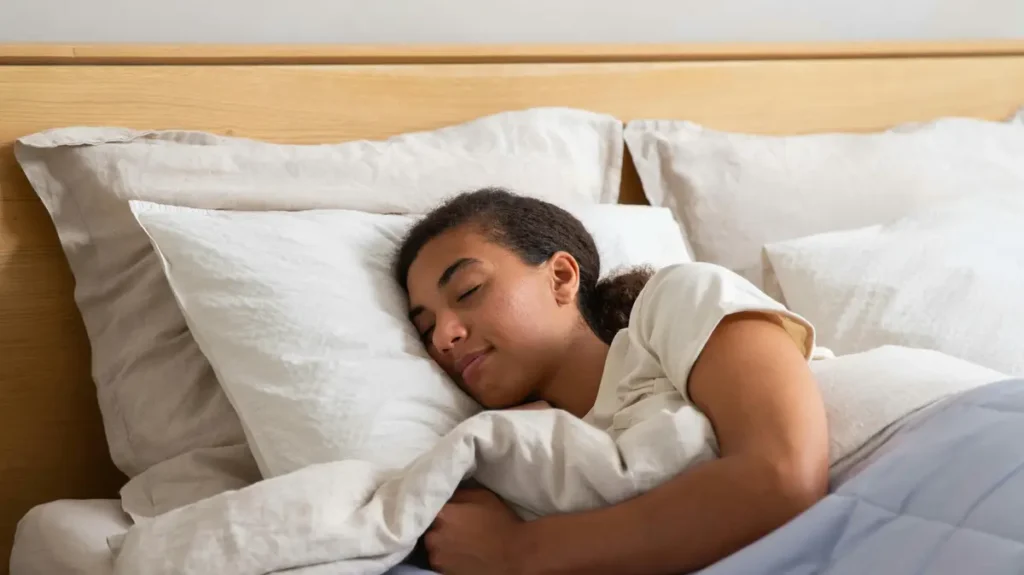Table of Contents
- Introduction to the Importance of Sleep in Sports Performance
- What Happens to Your Body During Sleep?
- Why Sleep is Essential for Athletes
- The Science of Sleep and Performance
- How Much Sleep Do Athletes Need?
- Common Sleep Problems Among Athletes
- Tips for Enhancing Sleep for Better Recovery
- The Role of Nutrition and Hydration in Sleep Quality
- Sleep Tracking Tools for Athletes
- Napping for Athletes: Does It Help?
- Conclusion
- FAQs
Introduction to the Importance of Sleep in Sports Performance
Athletes are always looking for ways to improve their performance, whether it’s through training, nutrition, or mental preparation. But there’s one often-overlooked factor that has a huge impact on success: sleep. Sleep isn’t just a time for rest; it’s a key part of recovery, allowing the body to repair itself and the brain to recharge. This article dives into the role of sleep in athletic performance and provides tips for enhancing recovery through better sleep habits.

What Happens to Your Body During Sleep?
Sleep Stages and Their Impact on Recovery
Sleep is a dynamic process divided into different stages: light sleep, deep sleep, and REM (rapid eye movement) sleep. Each stage has a unique function that helps in the body’s recovery. Deep sleep, for instance, is when muscle repair occurs, while REM sleep enhances cognitive recovery—both of which are crucial for athletes.
Physical Restoration During Sleep
During deep sleep, the body releases growth hormone, which plays a major role in tissue repair and muscle growth. This is the phase where damaged tissues are rebuilt, and the immune system strengthens. Inadequate deep sleep means poor recovery, which can result in muscle fatigue and a higher risk of injury.
Why Sleep is Essential for Athletes
Improved Muscle Recovery
Sleep is essential for muscle recovery. After intense physical activity, muscles need time to repair and rebuild. Without enough sleep, this process is hindered, leading to prolonged soreness and slower progress. Athletes who prioritize their sleep are more likely to experience faster recovery and better performance.
Cognitive Function and Reaction Time
Athletic performance isn’t just about physical strength—it also involves mental sharpness. Sleep is crucial for cognitive functions like reaction time, decision-making, and focus. Lack of sleep can slow reaction times and impair judgment, which could mean the difference between winning and losing.
The Science of Sleep and Performance
Role of REM Sleep in Athletic Performance
REM sleep is particularly important for brain function. It’s during this stage that the brain processes information and memories from the day, improving learning and problem-solving. For athletes, REM sleep enhances strategy formulation and reaction times, giving them a mental edge during competitions.
How Sleep Deficiency Impacts Stamina and Strength
Not getting enough sleep doesn’t just affect mental performance; it also affects physical stamina. Studies have shown that sleep deprivation leads to reduced endurance, lower energy levels, and decreased strength, making it harder to perform at peak levels during workouts or competitions.
How Much Sleep Do Athletes Need?
Ideal Sleep Duration for Optimal Performance
While most adults need 7-9 hours of sleep, athletes might require more—up to 10 hours—depending on their training load. This is because intense physical activity increases the need for recovery time, which is largely facilitated by sleep.
Quality vs. Quantity of Sleep
It’s not just about how long you sleep, but also about sleep quality. Deep and uninterrupted sleep is far more beneficial than longer periods of light, restless sleep. Athletes should aim for consistent, high-quality sleep to maximize recovery.
Common Sleep Problems Among Athletes
Overtraining and Sleep Disruption
Overtraining can lead to sleep disturbances, making it difficult to fall asleep or stay asleep. The body’s stress response is heightened by excessive training, which can cause restlessness and delay recovery.
Stress and Anxiety-Related Sleep Issues
Athletes, especially those in high-pressure sports, often experience stress or anxiety before big events. This can interfere with sleep, making it harder for them to relax and get the rest they need. Managing stress through techniques like meditation can be beneficial.
Tips for Enhancing Sleep for Better Recovery
Maintain a Consistent Sleep Schedule
Going to bed and waking up at the same time every day helps regulate the body’s internal clock. Consistency ensures that athletes are getting the right amount of sleep each night, even during periods of intense training.
Create an Optimal Sleep Environment
Athletes should create a sleep-friendly environment by keeping the room cool, dark, and quiet. A comfortable mattress and pillows also contribute to a better night’s rest.
Avoid Stimulants and Electronics Before Bed
Caffeine and blue light from phones and computers can interfere with sleep. Athletes should avoid these stimulants at least an hour before bed to improve their chances of falling asleep quickly.
The Role of Nutrition and Hydration in Sleep Quality
Foods That Promote Sleep
Certain foods, such as bananas, almonds, and turkey, contain nutrients that promote better sleep. These foods are rich in magnesium and tryptophan, both of which help the body relax and prepare for sleep.
Timing of Meals and Hydration for Better Sleep
Eating large meals or drinking too much water right before bed can disrupt sleep. Athletes should aim to have their last meal 2-3 hours before bedtime and stay hydrated throughout the day rather than drinking large amounts before sleep.
Sleep Tracking Tools for Athletes
Wearable Sleep Trackers
Wearable technology, such as smartwatches, can help athletes track their sleep patterns. These devices measure sleep duration and quality, providing useful data for improving sleep habits.
Using Data to Improve Recovery
Analyzing sleep data can help athletes understand how well they’re recovering and adjust their routines to improve performance. By identifying patterns, athletes can fine-tune their sleep schedules for better results.
Napping for Athletes: Does It Help?
The Benefits of Short Naps
Short naps can help athletes recover from sleep deficits and improve performance. A 20-30 minute nap can boost alertness and reduce fatigue, especially on days with intense training sessions.
Timing and Duration of Naps for Performance
The best time to nap is during the early afternoon, and the duration should be kept to 20-30 minutes. Longer naps can cause grogginess, while shorter naps can provide a quick energy boost.
Conclusion
Sleep is one of the most important yet underrated aspects of athletic performance. From physical recovery to cognitive function, sleep influences nearly every part of an athlete’s ability to perform. By understanding the role of sleep and implementing tips to improve rest, athletes can unlock their full potential and achieve
better results in both training and competition.
Read more: Top 10 Foods Rich in Dietary Fiber for Better Digestion and Weight Loss – WildlyAdored Fitness Tips
FAQs
How does sleep enhance muscle recovery?
Sleep promotes the release of growth hormones that aid in muscle repair, making it essential for recovery after intense workouts.
What can athletes do to improve their sleep?
Athletes should maintain a consistent sleep schedule, create a relaxing sleep environment, and avoid stimulants before bed.
Is there a specific sleep stage most important for recovery?
Deep sleep is crucial for physical recovery, while REM sleep plays a vital role in mental and cognitive restoration.
Can napping compensate for lost nighttime sleep?
Napping can help reduce fatigue and improve alertness, but it’s not a full replacement for a good night’s sleep.
How does poor sleep affect athletic endurance?
Lack of sleep reduces stamina, energy levels, and muscle strength, all of which are critical for maintaining peak athletic performance.


Leave a Reply